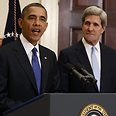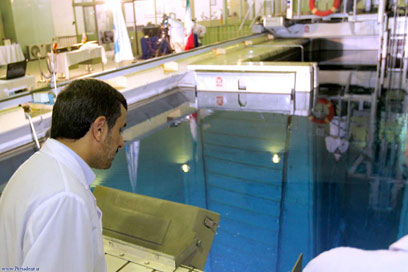
Long road to Tehran
Op-ed: Any US military campaign to halt Iran's nuclear program will be accompanied by diplomacy
Next secretary of state John Kerry, designated defense secretary Chuck Hagel and designated CIA director John Brennan will serve as Obama's supreme cabinet during his second term as president of the United States and commander in chief. Many are wondering how these appointments will affect the US' foreign policy, and specifically Israel.
Most of the conflicts until the end of the last century ended with the fall of a regime, the conquest of a capital city and the seizure of the government's assets. Most of these conflicts were decided due to a technological and strategic advantage held by one of the sides.
Since terror acquired a strategic dimension, the military victory has been accompanied by diplomacy. Winning in the battlefield is not enough anymore. At best it paves the way to negotiations. This phenomenon is particularly evident in the Middle East.
The US does not plan on invading Iran as it invaded Iraq in 2003. It will not deploy its forces in the capital and will not remove Iran's leaders from power. Should the US remain determined to halt Iran's nuclear program, it will do so through a long term, patient strategy of sanctions or by way of a surprise attack meant to cause irreparable damage to Iran's nuclear infrastructure, as well as great shock. The US may also employ a combined strategy of tightening sanctions and gradually increasing military pressure – from a naval siege to pinpoint strikes followed by a massive attack that will cause the regime in Tehran to relinquish its nuclear program.
Either way, diplomacy is crucial. A determined and united coalition must be formed in advance to support a maneuver that will take a relatively long time. Eventually, following the military/diplomatic shock, grueling negotiations are expected. There may even be setbacks and a return to fighting while talks are ongoing. Therefore, the team in charge must be comprised of people who are determined to conduct a military campaign yet know how to incorporate diplomacy into it.
When John Kerry, a decorated Vietnam War veteran, ran for president in 2004 against George H.W. Bush he stressed his military approach. But in the early 70s he was one of the leaders of the protest movement against the war. Kerry, who has Jewish roots, is a supporter of Israel and backs the Road Map for peace initiative.
Hagel, who is also a decorated veteran, was in favor of going to war with Iraq, supported the war in Afghanistan, and after diplomacy in Kosovo failed, he also supported going to war in the Balkan region. In each of these cases he was later among the leaders of those who called to end the campaign and pull the forces out. In 2009, following his appointment as co-chairman of Obama's Intelligence Advisory Board, he said: In the Middle East it is not a matter of a decisive victory or failure; what is needed is the right combination that will eventually lead the locals to take their destiny into their own hands.
Brennan is mainly a man of "carrots," not "sticks."
But even with this team, Obama will be the one who makes the decisions. Whether we approve of his policies or not, Obama has proven that he is a dominant leader who realizes his vision. The diverse team he appointed will help him maneuver between military action and diplomacy.
We will find the answer to the question "what does the future hold" not in the appointments, but in the leader. The team will back his decisions and balance out the outcome.
Eitan Ben-Eliyahu is a former commander of the of the Israeli Air Force











